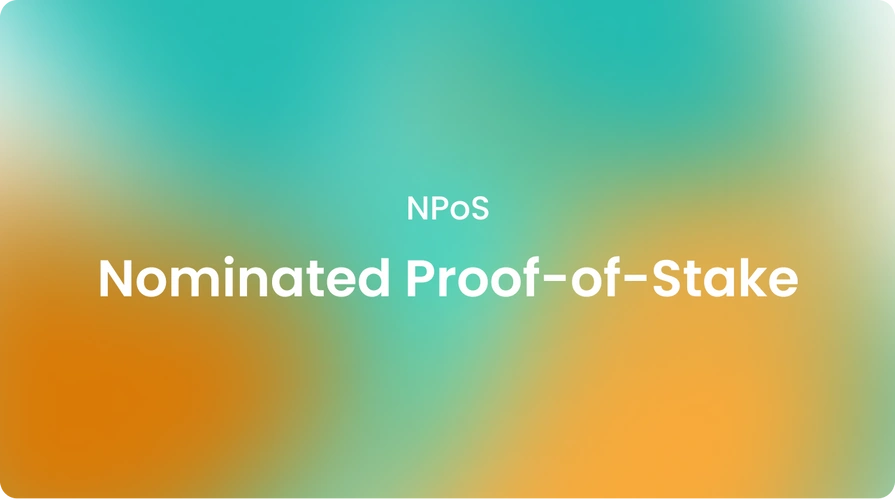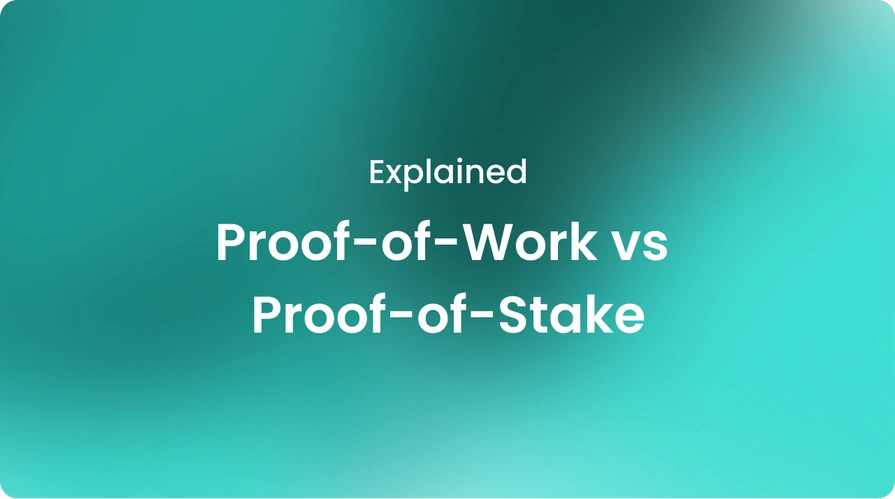|technology, knowledgehub
What Is Nominated Proof-of-Stake (NPoS)?

Blockchain technologies have continually evolved since Bitcoin first introduced proof-of-work (PoW) consensus, and one of the most promising alternatives is proof-of-stake (PoS), with its types such as nominated proof-of-stake (NPoS).
PoS addresses some of PoW's inefficiencies while maintaining decentralization and security. Within PoS, nominated proof-of-stake (NPoS) is an innovative approach currently powering innovative blockchains. Let's explore how NPoS works and why it presents such compelling opportunities in detail!
NPoS is a variation of the traditional PoS consensus mechanism that separates the roles of crypto-staking and block validation. Stakeholders called "nominators" vote through staking to elect blockchain "validators" tasked with proposing and validating new blocks.
Randomly choosing validators in proportion to their stake incentivizes their participation and promotes honest behavior. Their positions come with responsibilities as well as rewards.
These nominators play a key role by endorsing trusted validators. In return for shouldering counterparty risk, nominators receive a portion of validator rewards in NPoS.
Additionally, this nominating process decentralizes control over block production while still incentivizing investment in network uptime and security through the "skin in the game" of staked assets.
How does the nominated proof of stake work?
Each round, or "epoch," starts by selecting validators based on their staked amounts and nominations received. The greater the stake and trust placed in a validator, the higher their chances of approval.
Once elected, validators take turns producing and verifying blocks in a random order to prevent centralization. This balanced approach creates incentives for participation and honesty across all roles.
Blockchain nodes track validator performance, and underperforming or malicious ones face penalties proportionate to their offense through "slashing"—the partial forfeiture of staked assets.
As a deterrent, nominators can also be slashed if they persistently support dishonest validators. Together, these accountability measures reinforce the integrity of the consensus mechanism process.
What are the advantages and disadvantages of NPoS?
A key advantage of NPoS is how it balances security, decentralization, and efficiency through its division of roles and built-in feedback loop. The random selection of trusted, high-stake validators and their turn-based block production help optimize throughput.
At the same time, community participation as nominators and incentives to identify quality validators enhance decentralization. However, disadvantages of NPoS exist too.
By vouching for validators, nominators assume counterparty risk and may lose stake if penalties are incurred. Nominators also have no guarantee that their votes will result in the election of their preferred validators in each round.
However, on balance, NPoS presents a sophisticated approach to proof-of-stake consensus that has resonated with innovative blockchain projects.
What is the difference between PoS and NPoS?
While PoS and NPoS are both consensus mechanisms based on crypto token holdings, there are a few key procedural differences.
Here are some of the differences between PoS and NPoS:
Role separation
PoS has validators only, while NPoS splits the roles between validators and nominators.
Control of stake
Validators fully control their staked funds in PoS, but nominators direct some control over validators' stake in NPoS via nominations.
Selection process
PoS relies solely on stake amounts, whereas NPoS weighs both stakes and distributes nominations to elect active validators.
Risk distribution
Validators bear the full burden of slashing penalties in PoS, whereas in NPoS, these penalties are shared between validators and nominators based on their actions.
Participation
Both PoS and NPoS require staking, but only NPoS allows users to participate as non-technical nominators without validator nodes.
To sum up, while PoS focuses only on stake, NPoS introduces the additional dimension of social consensus through nominations to enhance decentralization.
How does proof-of-stake work?
At a basic level, proof-of-stake replaces crypto mining with token staking to achieve distributed system consensus. Here are the key elements of how standard PoS works:
- Token holders stake (lock up) their crypto coins to earn rewards and secure the network.
- By staking more tokens, holders increase their chances of being selected to validate a block and earn rewards.
- The protocol chooses validators probabilistically based on their percentage of total staked tokens.
- Validators must run full nodes and participate in block production and confirmation to earn staking yields.
- If validators produce invalid blocks or go offline, they risk the partial or full slashing of their deposits.
- Valid block producers earn both transaction fees and inflationary block rewards proportional to their stake.
- If no supplemental mechanisms are introduced, large stakeholder groups will centralize consensus over time.
PoS is more eco-friendly than energy-heavy PoW. But on its own, it remains vulnerable to centralization risks mitigated by the additional social consensus layer of NPoS. If you need a further comparison, make sure to check out “Proof of Work vs. Proof of Stake.”.
What are the nominated proof-of-stake best practices?
For those looking to participate in the growing NPoS ecosystem, here are a few recommendations:
- New entrants should consider the nomination pools. Pools allow joining the network with even small stake amounts. For larger stakes, research validators directly by checking metrics like uptime and commission on platforms. Self-nomination may be preferable for stakeholders too.
- To avoid losing rewards if anyone gets slashed, it is recommended to diversify nominations across multiple validators. No more than 30% of the stake in a single validator is recommended.
- Monitor active validators and unnominate any exhibiting malicious or offline behavior as soon as possible to avoid potential slashing.
- Use tools to track network updates and participate in on-chain governance to vote on proposals enhancing the NPoS mechanism.
By following best practices, users can harness the additional layer of security and decentralization provided by NPoS protocols while maximizing yields from token staking. NPoS is an improvement on traditional PoS and well worth exploring.
The bottom line
Nominated proof-of-stake has enhanced the proof-of-stake model to introduce a voter-like nominator role separate from validators. This separation of concerns in NPoS protocols boosts the decentralization and security of the consensus mechanism.
By enabling participation through nomination pools and light clients, NPoS also lowers the barrier to participating in securing PoS networks, empowering more individuals globally.
With their additional layer of social consensus, NPoS protocols appear well positioned to continue supplanting energy-hungry proof of work over time. With continued advancement, NPoS could one day achieve the longstanding goal of enabling true decentralization at scale.
For those interested in getting involved, it is better to find a secure crypto service provider. Cryptobunq is a great first step to start harnessing the benefits of crypto through convenient services while supporting network security via staking endeavors.
Users can store, send, and stake digital assets with Cryptobunq easily with its integrated crypto banking services. CBQ is a one-stop-shop crypto service provider that you can trust from tokenization to node-as-a-service solutions.
You can easily integrate these services into your business and grow your crypto and blockchain projects with security, thanks to Cryptobunq. If you want to learn more about our services, make sure to check out our case studies or contact us directly. Adapt to the future of blockchain with CBQ today!













